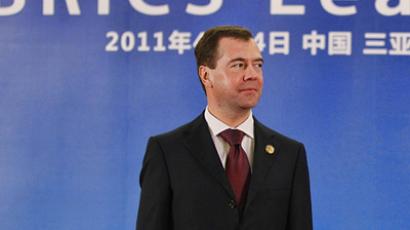Time for BRICS to head IMF?

The race to be boss of the International Monetary Fund is not so much about who, but rather where the candidate comes from. And while Europe traditionally decides who gets the post, this time around, the BRICS countries have other ideas.
With the former IMF director Dominique Strauss-Kahn out of the financial picture, the organization is looking for a suitable replacement.The EU already has a candidate lined up, but the four emerging economies of Brazil, Russia, India, China and South Africa say it is high time someone else had a go. The current financial situation in Europe may suggest a new approach is needed to solve the many problems they are grappling with. By the looks of it, the IMF will go in the other direction.“The weight of tradition and also the fact that there has been a long-standing deal between the US and Europe, the US will have the World Bank and Europe has the fund,” said Indira Rajaraman from Indian Statistical Institute.“I'm sure the Europeans would convince all leading thinkers on the matter that at this juncture you still need someone familiar with the problems of the Eurozone.”The runner-up is the French Finance minister Christine Lagarde.And while Europeans hail her as one of the strongest economists in the Eurozone, some remain skeptical about her prowess.“If Christine Lagarde becomes the next head of the IMF, I think in the short run one should expect more of the same as long as they can sustain that,” said Robert Naiman, policy director of the Just Foreign Policy organization. “It is not obvious: Greece maybe at the edge of default and perhaps, even leaving the euro. So they may not be able to maintain these policies but the trend is for them to continue to try.”Greece’s debt is eyewateringly high. Portugal and Spain are quickly catching up, and could soon find themselves in a similar situation. And while the BRIC countries ask why should there be a European at the IMF helm and what happened to the promise of fresh new faces, some IMF members seem to have surprisingly short memories.“I think that if Christine Lagarde does get the job, I think it will be a betrayal of the IMF promise,” claimed political analyst Jyoti Malhotra. “If you remember, Dominique Strauss-Kahn only a few months ago had said that there should be a change in the global order. Especially since India and China over the last 3-4 years have been the world's largest economies. And it's India and China that had really pulled the world out of the economic slump that it has been in the last two years.”One of the world’s most powerful organizations, the International Monetary Fund, has the power not only to rescue countries, but to plunge them into despair.Take Russia, for example. Some say the organization played a crucial role in bringing about the default of 1998, which left thousands of people penniless and desperate.“I remember when the Soviet Union broke up, the IMF and the rest of the G7 prescribed economic advice to the new Russia,” said Joyti Malhotra. “And it was completely disastrous. This complete sort of unleashing of the Russian economy at the time. [It] completely destroyed Russia in several ways. And I think that's what the IMF has done to several other economies: bailing out Greece and as you know, bailouts for Portugal, Italy and Spain are also on the cards.”Sex scandals, broken pledges, deepening debt. As Europe attempts to untangle itself from its fiscal chaos, it seems clear that a new approach is vital to stay afloat. But the International Monetary Fund seems to focus more on keeping rising economies out than on solving the many problems it now faces.














